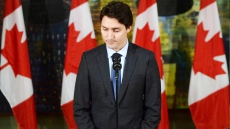OTTAWA — A federal panel created in the wake of the Supreme Court ruling on assisted death will no longer be asked to make recommendations to the government and will now simply report on its consultations on the issue.
Justice Minister Jody Wilson-Raybould and Health Minister Jane Philpott say in a statement that along with the modified mandate, the date for the panel to make its report has been extended by a month to Dec. 15.
In July, the Conservative government established the panel to solicit attitudes and opinions of Canadians and key stakeholders after the Supreme Court of Canada recognized the right of clearly consenting adults who endure intolerable physical or mental suffering to end their lives with a physician's help.
The court also gave Parliament one year to establish a set of laws to govern physician-assisted death.
The panel faced criticism from some, including the B.C. Civil Liberties Association, because two of its three members were federal witnesses who argued against assisted suicide when the case was heard.
A letter from the ministers to the panellists explains the changes to the original November deadline and the mandate are due to the "limitations imposed by the recent election period."
"We recognize that it is not feasible for you to deliver a professional and thoughtful report by this deadline. We are therefore extending your mandate to December 15, 2015," states the letter, which has been posted on government websites.
"As this timeline will remain challenging, we are also modifying the terms of the panel's mandate. Rather than providing legislative options as per your original mandate, we would ask that instead you prepare a report summarizing the results and key findings of your consultations."
Harvey Max Chochinov, the panel's chair, had defended the panel's independence and said the government chose panellists who intended to be objective.
Chochinov also serves as the Canada research chair in palliative care at the University of Manitoba. His co-panellists are University of Ottawa law professor Benoit Pelletier, a former Quebec cabinet minister who is a constitutional expert, and Catherine Frazee, former co-director of Ryerson University's institute for disability research and education.
The government notes the panel consulted directly with 66 experts through 51 meetings in five countries, as well as 95 representatives from 48 Canadian organizations.
It says it's received over 300 document submissions from stakeholders and over 11,000 responses to its online consultation.
The letter to the panel says the modifications mean the report will be ready in time to be used for the next stage of the government's response to the Supreme Court's decision.
Wilson-Raybould said in the statement that the government is profoundly grateful for the hard work and personal commitment of all three panel members.
"Physician assisted-dying is a deeply personal and complex matter and they have conducted their work with utmost professionalism. Recognizing that this is of interest to all Canadians, we are committed to ensuring a thoughtful, well-informed legislative response," Wilson-Raybould said.
Philpott, meanwhile, said the government looks forward to receiving the panel's final report and "will use it as we continue to develop the government's response to the Supreme Court of Canada's decision."






